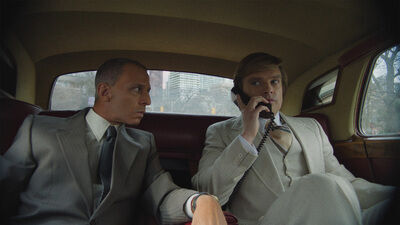
David Cronenberg’s “The Shrouds” is best viewed in pure auteurist terms. With hair that unmistakably resembles the director’s, Vincent Cassel stars as Karsh, the proprietor of a high-tech burial business that allows the bereaved to keep an eye on their loved ones’ decaying corpses. The headstones have video screens, and there’s even a smartphone app that allows users to watch remotely. Shots aren’t limited to “the classic wide-angle view,” and the resolution has been upgraded to 8K. But when nine of these smart graves are vandalized, Karsh must figure out why, which means coming to terms with his own demons.
Karsh’s wife, Becca (Diane Kruger), died of cancer, and he has an obsessive relationship with checking in on her buried skeleton, which lately seems to have developed some odd nodules. Karsh’s own bone structure is also deteriorating, even in life. “Grief is rotting your teeth,” his dentist tells him in the opening scene, offering to send him JPEGs of Becca’s old dental X-rays if they will have therapeutic value. Compounding Karsh’s sense of living with the dead is the fact that Becca’s sister, Terry, looks just like her—and in fact is played by Kruger, too, as is “Hunny,” the Siri-like digital personal assistant who manages Karsh’s life. Flashbacks show Karsh and Becca as they come to grips with how cancer surgeries progressively mutilate her body. In the present action, Terry insists that, despite looking like her sister, she has a body of her own. The sense that Terry is a sort of simulacrum of Becca—almost the same, but not quite—leads to what is at first an unacknowledged erotic tension between them.
Having spent a career depicting live flesh in various extreme states, Cronenberg now turns specifically to the question of what it means to film bodies that life has departed. The concept is hardly new to his work. “The Fly” has long been seen as a cancer and AIDS allegory; “Crash” posited a link between sex drives and death drives; and “Crimes of the Future,” which showed at Cannes two years ago, pondered the psychological impact that physical mutation can have on intimacy.
But “The Shrouds” finds Cronenberg at his most arid, talky, and intellectual. That was fine by me, although it took some time to get on the movie’s wavelength. While the ideas—notably the intimation that the dead could enable hackers to surveil the living—are provocative, the execution can be shaky. Guy Pearce, as Terry’s ex-husband, turns in an irritatingly mannered performance. But maybe having a fully vital version of “The Shrouds” wasn’t the point.

